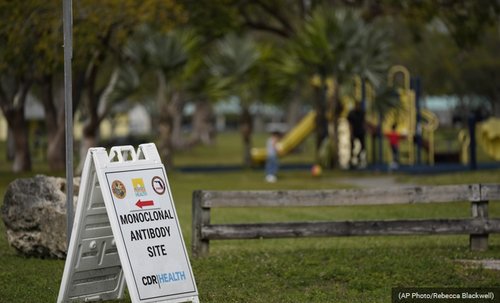White House Wants $22.5 Billion For More COVID Funding
Authored by Philip Wegmann via RealClear Politics (emphasis ours),
At the beginning of the pandemic, the previous president had a vision – one his scientific advisors urged him to abandon. Not only did Donald Trump want the economy back open, he said that by Easter Sunday of 2020, “you will have packed churches all over the country.” It never happened, at least not on the scale he envisioned.
Two years later, after millions of vaccines have been administered and the virus has receded from its peak, things look very different. A sign of the times: After two years, the White House plans to resume regular public tours. Doors are scheduled to open on Good Friday.
As Biden officials smile about the poetry of that rhyming calendar, the White House is dealing with a political paradox: How to secure more COVID aid from Congress as the administration pivots away from the pandemic. It’s proving to be a hard sell.
The same morning the White House announced a return to business as usual for tourists, the administration raised the alarm about a virus they believe is on the run. Cases are down 95% since the peak of the omicron variant. Hospitalizations have similarly plunged by 85%. More than 215 million Americans are already fully vaccinated. Yet officials warned on a call with reporters Tuesday morning that their pandemic coffers could soon be empty.
“For months, we’ve made clear to Congress, on a bipartisan basis, that the funding for tests, treatments, and vaccines was drying up and that additional funds would be needed,” the official said.
How much money do they need? The number administration officials floated was $22.5 billion. And if they don’t get it? White House budgeteers will make trims to the request. They warn, however, that the U.S. won’t have enough boosters or variant-specific vaccines “for all Americans,” according to a fact sheet provided by the administration. They won’t be able to buy monoclonal antibody treatments, either, and the current supply is expected to run out as soon as May. Without a cash infusion, they predict that the testing capacity will collapse.
Governors were warned late Tuesday morning that the administration would be reducing the number of monoclonal antibody treatments by 30% within a week.
Republicans say they aren’t necessarily opposed to more COVID spending. They just want to know where all the other COVID cash went first, as Sen. Richard Shelby explained to Politico. “There’s a doubt that they need this money with a lot of us,” explained the Alabama Republican. “I’ve said this for weeks, a real accounting of the money [already spent on COVID] that the American people deserve and then go from there. If there’s no money left, and it’s not hidden somewhere, and if they show a need, then you got, maybe, a persuasive case.”
Asked if the White House would negotiate for a lower number, a Biden official gave an emphatic “no.” And when then asked if they would accept using different funds for their COVID priorities, the official demurred, saying only that “the money they provided over a year ago has been well spent, but we defer to Congress on the specific legislative approach.”
It is a routine kind of squabble, albeit one that comes at the tail end of a once-in-a-century pandemic. The difficulty for Biden may be that the public is moving on after he pivoted away from the virus during his State of the Union address. Masks are increasingly uncommon these days. Dr. Anthony Fauci has receded from the cable news circuit. News of a land war in Europe now eclipses COVID coverage.
White House Press Secretary Jen Psaki told RealClearPolitics that COVID funding was a necessity, despite the public’s shifting attention. “We’re in a different stage and we have a range of tools in order to fight the pandemic,” she explained, adding that in order to keep up that fight, “We need money.” A new subvariant of the virus, BA2 omicron, has already made it to American shores. It is apparently even more transmissible than the original Omicron strain, Psaki noted, but also treatable. “We need to have masks, tests, boosters, treatments for [the] immunocompromised in order to continue to treat the American people during a pandemic,” she said. “So, it remains urgent.”
That urgency was underscored by breaking news Tuesday evening. At least nine Democrats had already tested positive for the virus after those lawmakers attended a party retreat last week in Philadelphia. The president was also at the event, but he tested negative Sunday night, Psaki told reporters. Then, Kamala Harris’ husband Doug Emhoff tested positive.
The vice president had stood shoulder to shoulder with Biden earlier in the day at an indoor event, and she was expected to share the stage with the president at an event in the East Room of the White House to celebrate “Equal Pay Day.” The room was packed front to back, but Harris wasn’t there.
“Earlier today, the Second Gentleman tested positive for COVID-19. Out of an abundance of caution, the Vice President will not participate in tonight’s event,” the White House announced just moments before Biden entered the room. “The Vice President tested negative for COVID-19 today and will continue to test.” The president shrugged off the news like it was routine.
“Welcome to the White House,” Biden told the crowd that included House Speaker Nancy Pelosi and numerous members of his cabinet. “This is the biggest crowd we’ve had since we got here.” Only later, after a gaffe where he mistakenly said that “the first lady’s husband contracted COVID,” did Biden ask the mostly unmasked crowd to send to Harris “our love.”
Tyler Durden
Thu, 03/17/2022 – 21:05

